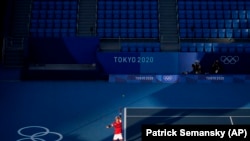On July 28, the Russian state news agency TASS reported that the Russian Olympic Committee (ROC) team was filing a complaint with the organizers of the Tokyo 2020 Olympic games against a Chilean journalist.
“Russian tennis star Medvedev asked the International Tennis Federation (ITF) on Wednesday to strip the accreditation of a Chilean journalist, who claimed that Team ROC ‘cheated’ on its uniforms at the Olympics in Tokyo,” the article read.
The journalist in question was Sebastian Nahmias, who allegedly tried to “incite a scandal” by repeatedly asking similar questions to ROC athletes. The article provides no details about the repeated questions.
On July 29, TASS published a follow-up claiming that the games’ organizers were investigating. In that article, the purported claim about uniforms was reiterated.
“Reached by a TASS correspondent late on Wednesday night, Chilean journalist Nahmias said he never intended to offend the Russian tennis player by saying that the team of Russian players ‘cheated’ on the uniforms for the 2020 Olympics in Japan,” it read.
Trouble is, both articles are misleading. Polygraph.info could find no other accounts which reported that Nahmias mentioned the ROC’s uniforms or accused the team of cheating.
Regarding Medvedev, some Russian media reported his answer to Nahmias, but not the question he was asked. According to The Guardian, the Chilean journalist asked:
“Are the Russian Olympic team athletes carrying a stigma of cheaters in these Games after the scandal, and how do you feel about it?”
That is a question and not an accusation. The Guardian also noted that English is not the reporter’s first language, and that Medvedev seemed not to understand Nahmias at first.
Another website covering the games, Essentially Sports, also reported Nahmias’ question using essentially the same words, quoting a tweet from Guardian sports correspondent Tumaini Carayol.
Infobae, a news outlet covering Latin America with a dedicated Olympic games section called “Around the Rings,” provided a full transcript of the exchange between Nahmias and Medvedev.
According to that transcript, Nahmias asked the question twice (because Medvedev asked him to repeat it): “Are the Russian Olympic team, the athletes carrying a stigma of cheaters in these Games, and how do you feel about it?
According to Infobae’s transcript, when Medvedev responded with hostility, Nahmias said: “I’m asking if there’s a stigma, I’m not saying it.” Nahmias later said he wasn’t making a “judgment.”
On July 28, the Russian-language sports news outlet Sport Express reported on the exchange and got a comment from Nahmias.
“I asked if there was a stigma on the Russian athletes; I didn’t present my opinion,” Sport Express quoted Nahmias as saying.
Nahmias told Sport Express that he had asked another Russian athlete the same question and did not get a hostile response, and thought that Medvedev might not have understood the question.
Infobae reported on the IOC’s response to Russia’s complaint about the Chilean journalist.
“We believe that both athletes and representatives of the media are entitled to their own freedom of speech, whilst respecting the Olympic values, and we have therefore no further comment on the matter,” the IOC told the publication.
After Russia’s state-sponsored doping program was discovered, it was banned from a number of international athletics competitions, including the Olympic games.
Russian Olympic athletes are still allowed to participate, but under the banner of the Russian Olympic Committee, not the Russian flag, which is banned from the Olympics along with the country’s anthem. However, critics have noted that the ROC flag and symbol feature the Russian national tricolor, making the ban almost moot.






